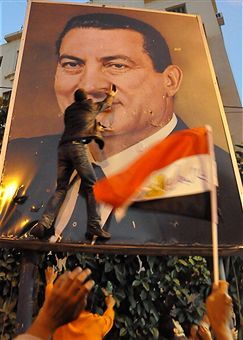 A week ago, that would have seemed a foolish question. But after thousands of Egyptians
have taken to the streets for two consecutive days of protest, even Hosni Mubarak is beginning to look vulnerable.
A week ago, that would have seemed a foolish question. But after thousands of Egyptians
have taken to the streets for two consecutive days of protest, even Hosni Mubarak is beginning to look vulnerable.
It has placed the West in a dilemma, in a way that Ben Ali’s fall did not. For years, the fear has been that President Mubarak is the lesser of two evils. Though authoritarian, Mubarak’s Egypt is a pro-Western state willing to live with Israel and combat Islamist terrorism. On the hand, the Muslim Brotherhood opposition, which shares an ideological wellspring with Al Qaeda, is a grave threat to Western security.
Unsurprisingly, Hillary Clinton’s first statement about the protests was ambivalent: “Our assessment is that the Egyptian Government is stable and is looking for ways to respond to the legitimate needs and interests of the Egyptian people.” As the baton-wielding police responded with tear gas and beatings in a crackdown that has shown no tolerance for dissent, William Hague voiced a more nuanced position:
“It is important that the government listens to the concerns of those demonstrating and respects rights of freedom of assembly and expression. Openness, transparency and political freedom are important tenets of stability. We urge the government and demonstrators to seek a peaceful way forward.”
Back in Britain, officials are busy preparing the government’s new strategy for “Building Stability Overseas”, which was trailed in the SDSR. In light of recent events, they would do well to emphasise not just long-term poverty-alleviation, as DfiD officials tend to do, but the importance of what the Foreign Secretary said – openness, transparency and political freedom. Perhaps it may even be wise to rename the document. My proposal: Promoting Free Societies.






Comments